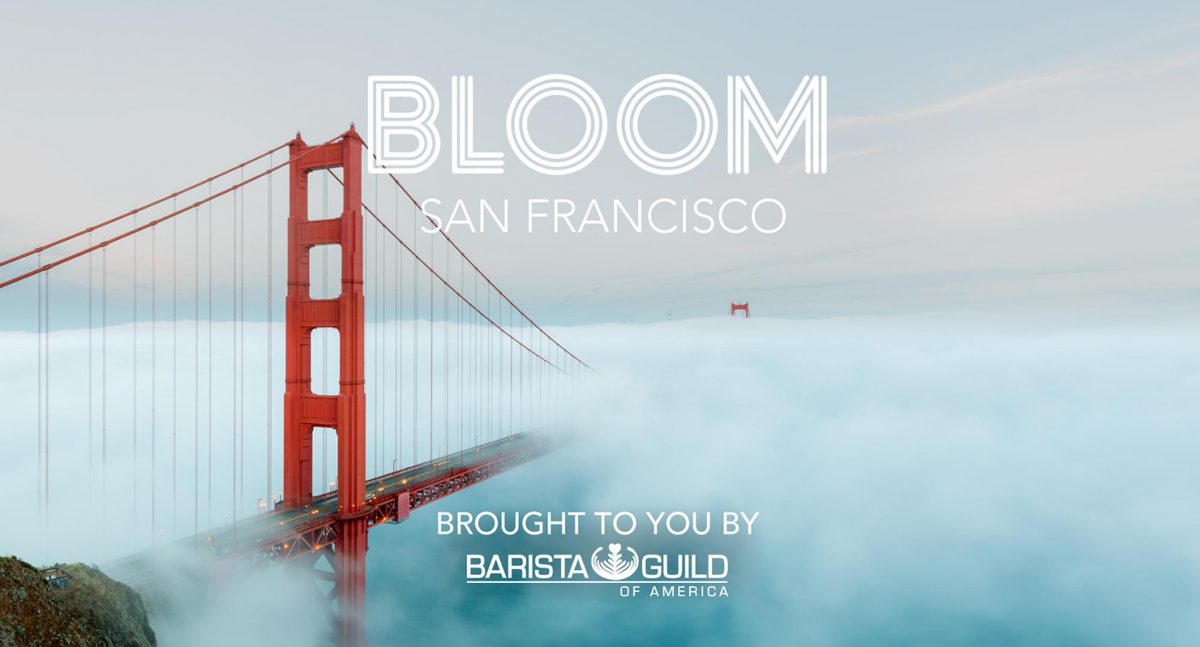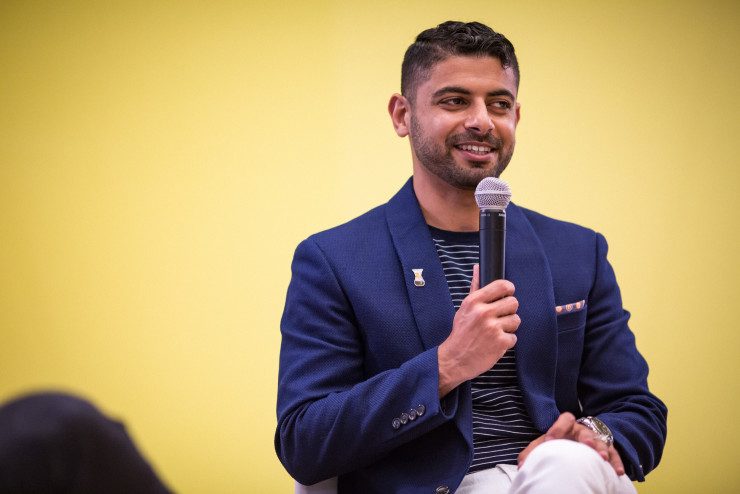
The Summer 2017 edition of Bloom—the Barista Guild of America’s industry-focused live speakers forum—took place July 26th-28th at The Pearl in San Francisco. As attendees entered, we were given a choice from a rainbow of notNeutral Bloom mugs, which we were told to keep on hand the entire day and use instead of disposable cups.
The day started off with pastries from Tartine and coffee from several local contributors, including Ritual, Counter Culture, and Andytown. After way too much coffee, we settled into an opening speech from sponsor Olam Coffee’s Todd Mackey, where he stated the hope that we would come away with actionable ideas for ourselves and our businesses. After most of us had silenced our smartphones, he asked us to take them back out and introduced us to Slido, an interactive online platform where we could post questions in real time, anonymously if desired.
When discussing how they felt about using their phones as an interactive platform, most attendees were apprehensive at first but had an overall positive response. Hana Yoshimoto, barista at Blue Bottle, said, “I came in with a mentality that smartphones are a distraction even when used in a purposeful way, but it opened my mind up to the possibility that they could be interactive and helpful.” Regarding anonymity, she was a fan: “I’m also someone who doesn’t like attention, so it allowed me to put forth a lot of questions and participate in a way that I wouldn’t have otherwise.”
Mackey introduced Mokhtar Alkhanshali, founder and CEO of Port of Mokha, who went on to talk about how the roots of coffee hold the keys to its future. He started by introducing the all-too-familiar dilemma of leaf rust, which in 2013 cost Central America 1 billion dollars in losses, leading the Guatemalan government to declare a state of emergency. He then stated that to solve problems like leaf rust that plague us in the present, “we need to look at our past and know where we came from.”
He took us back to Yemen, just across the water from coffee’s ancestral home, Ethiopia, where heirloom varieties hold promises of genetic diversity and potential solutions. Where the Ethiopian government is protective of coffee’s genetic secrets, according to Alkhanshali, Yemen is open to sharing them with researchers across the world. He went on to discuss the exceptionally high cupping scores and complex flavor profiles of Yemeni coffees, while the audience tasted samples.

When asked if Yemeni producers would ever consider using the washed-process to fetch even higher prices for their coffees, which are currently all dry-processed, he responded that “the future of coffee is natural,” just like its past. Water conservation is as crucial to the future of coffee as genetic diversity, and Yemen is a bastion of both.
Prompted by a question from Wrecking Ball Coffee co-owner Nick Cho, Alkhanshali also dropped the surprise that writer Dave Eggers has spent the last three years writing a book about Alkhanshali’s coffee journey, titled The Monk of Mokha, available on Amazon for pre-order. He closed the conversation with the assertion that “the shortest distance between two people is a cup of coffee.”
We rolled straight into a panel moderated by Cho, titled “Fast, Cheap, Good: Pick Two,” about the world of specialty convenience coffee, featuring Molly Irwin of Fellow Products, Umeko Motoyoshi of Sudden Coffee, Kent Sheridan of Voila Coffee, and Tony Konecny of Yes Plz.
A major theme of the panel was, in Motoyoshi’s words, “meeting people where they’re at and celebrating where they’re at.” Panelists all spent time focusing on how to de-alienate customers who might be turned off by the specialty coffee ethos that our industry has created in trying to differentiate our product from its predecessors. Discussing the panel’s overall approach, attendee Daria Whalen, director of education at Ritual Coffee Roasters, said that “panelists spoke a lot about entry points into certain markets,” rather than equity on either side of those markets, which she felt was a good start, although not necessarily the whole conversation.
Irwin talked about incorporating volumetrics for home brewers who are ready to make better coffee but aren’t ready to invest in expensive scales. Motoyoshi emphasized how Sudden allows customers to enjoy top-quality, ethically-sourced coffee with almost zero equipment, so they don’t need to have access to expensive setups and education to enjoy great coffee. Sheridan, who also makes an instant coffee product, emphasized the quality that Voila works toward, making instant not just better than before, but on a level of flavor and consistency that specialty coffee drinkers have come to expect from any brewed coffee.
The restaurant Konecny supplies coffee to, Locol in Oakland, has incorporated a controversial $1 cup of coffee on the menu, and he elaborated on what makes that possible, emphasizing that he doesn’t think his restaurant’s $1 cups are competing with specialty cafes. “The truth is,” he asserted, “it’s much easier to do good restaurant coffee in a fast-food environment,” explaining that in his restaurants, coffee prep is a back-of-house operation with nearly zero waste, which allows coffee to get to customers at a price point they’ve historically been accustomed to, but at a quality and ethic level that specialty drinkers expect.
When asked what she thought the important questions would be in coffee five years from now, Motoyoshi asked, “Where are our customers? Are they with us yet? Are they excited about what we’re doing?” And with that, we broke for a rooftop lunch, which the BGA had ensured was labeled with allergen info so that all attendees could engage.
We returned to a talk about a field in which we are the customers, that of natural wine, with a talk from local winemaker Martha Stoumen. In her tightly-packed and informative segment, she emphasized the contrast between control over nature and working with nature. Discussing the difference in production between natural and conventional wines, she compared natural wine to cage-free eggs or grass-fed beef, highlighting the fact that the world has room for both the natural and the conventional.
When asked the question of how to tell whether a given wine is natural, Stoumen delved into the tension around defining natural wine. She doesn’t necessarily think that defining natural wines would benefit the industry, and asserted that voluntary ingredient labeling is the future for natural wine producers over third-party regulation. Meanwhile, she advised, go to wine shops that specialize in natural wine, talk to the bartenders, and when you try something you like, note the importer as well as the producer.
After Stoumen’s talk, we moved into an interactive session titled “Exploring Your Privilege with Boss Barista and the BGA,” led by Liz Dean, Ashley Rodriguez and Jasper Wilde. They started off with an exercise called Three by Three, where they asked three audience members (Ritual owner Eileen Hassi Rinaldi, Equator community engagement manager Akaash Saini, and Coffee Gundam founder Cat Mungcal) three questions each. In their responses, Rinaldi emphasized concerns over global and local coffee labor shortages and revealed a five-year aspiration toward creating employee housing, while Mungcal discussed the issue of mental health in coffee work.
Rodriguez and Wilde brought back Slido with an interactive poll around privilege, where audience members calculated their “privilege dollars.” The segment began a necessary discussion on how difficult it is to unpack privilege, which was further explored in the next segment, where we broke off into groups to discuss the specific topics of gentrification, sexual harassment policy, queer and trans inclusion, and intersection in 10-minute segments. On the overall impact of the privilege segment, attendee Jennifer Custard-Jarosz of Intelligentsia Coffee had mostly positive things to say: “I think in regard to this conversation, there’s still a lot of work to be done, but it was a good attempt.”
The Bloom event centers questions over answers, and the BGA definitely succeeded in pushing our minds in new directions. Speaker after speaker pitched questions and solutions in equal measure to problems faced across the supply chain, from the threats producers face in getting great coffee to cafes across the world, to dilemmas around pricing and service, to the lessons cafes can learn from other specialty industries. Throughout the day’s events, each speaker approached the underlying question of how to truly center people, meeting them on their level but always pushing forward.
Attendee critiques hinged on the fact that they wanted discussions to delve further into the realm of equity and truly move people outside of their comfort zone. As in the coffee brewing process, where the bloom refers to the moment where coffee grounds first meet water and the brewing begins, the Bloom event’s content doesn’t represent a finished product, but rather a start to many necessary conversations, especially those that push the boundaries of comfort and complacency.
RJ Joseph (@RJ_Sproseph) is a freelance journalist, publisher of Queer Cup, and coffee professional based in the Bay Area. This is RJ Joseph’s first feature for Sprudge.
The post Coffee Ideas Big And Small At Bloom SF appeared first on Sprudge.

